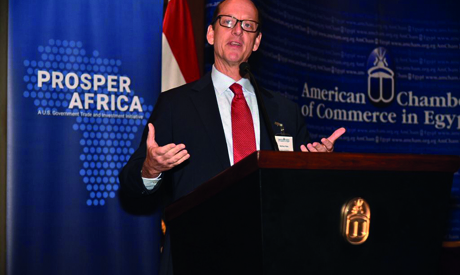
Interim coordinator of Prosper Africa Matthew Rees
“With six out of the 10 fastest-growing economies in the world and one billion customers and growing, Africa surely will be playing a major and growing role in the global economy in the decades to come,” Sherif Kamel, president of the American Chamber in Commerce (AmCham) in Egypt, told participants at a special briefing on the Prosper Africa Initiative to boost trade and investment between the US and Africa in Cairo recently.
The African continent is also increasingly attracting other foreign investment.
According to the UN Conference on Trade and Development (UNCTAD), in 2018 foreign direct investment (FDI) flows in North Africa increased by seven per cent to $14 billion while in Sub-Saharan Africa they increased by 13 per cent to reach $32 billion.
The GDP of African economies will exceed that of China by 2040, and by 2050 the African continent’s labour force will exceed that of both India and China combined, interim coordinator of Prosper Africa Matthew Rees told the attendees at the briefing, adding that Africa was “the economic future”.
The Prosper Africa Initiative supports both the US and African private sectors to make use of these demographics for future economic growth, Rees said.
Prosper Africa is a US government initiative launched during the US-Africa Business Summit in Mozambique in June and is meant to increase two-way trade and investment between the US and Africa.
According to Rees, of the Development Finance Corporation’s (DFC) new investment budget of $60 billion for investing globally, $40 billion will be focused on Africa. The DFC is an executive agency of the US federal government responsible for providing foreign aid through the financing of private development projects.
Economies in Africa offer many remarkable opportunities, for example in energy, infrastructure, agriculture, and oil and gas, according to an article entitled “Africa is Ready for Long-Term Investment. Here’s Why” published by the World Economic Forum in collaboration with the Project Syndicate, an international media organisation.
However, this potential needs to access capital for the continent’s greater prosperity.
“Debt has served as the backbone for economic growth or the supposed driver of economic growth in Africa for decades, not because of want but because that has been what has been on offer,” Rees said. He added that a better model for growth in Africa was foreign direct investment.
According to UNCTAD, Egypt is the largest recipient of FDI in the continent, although these investments have decreased by eight per cent. Net FDI inflows to Egypt in fiscal year 2017-18 stood at $7.7 billion, and Egypt has the advantage of a large population with a low-cost labour force, Rees added.
Egypt provides a “good home” for investors, he said, adding that the “scalable market that investment in Cairo provides compared to other countries is undeniable.
“From an investor’s point of view that is where my money would go,” he said.
The private sector was out in force at the event to make its voice heard on US-Africa partnerships. General Manager of IBM Egypt Wael Abdoush said the focus should be on investing in human capital in Africa, particularly education and healthcare.
He said there needed to be a focus not only on creating “new generations in Africa that will be able to maintain business, but also to create ideas for the benefit of the African countries.”
*A version of this article appears in print in the 14 November, 2019 edition of Al-Ahram Weekly.
Short link: